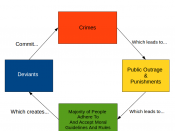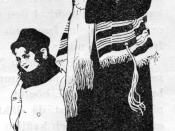According to Newman "ÃÂdeviance refers to socially disapproved behaviour "àthe violation of some agreed-upon norm that prevails in a community or in a society at large' (2000:177). However, what is ultimately deemed as deviant behaviour in the first place is often the result of some form of power that "ÃÂintentionally influence[s] others to act in a way that is consistent with [their] wishes, or even to change"æbeliefs, emotions, behaviours and identity' (Newman, 2000:324).
Forms of power that can influence and shape definitions of deviance and ensuing sanctions exist both at individual and institutional levels. For instance, the media plays a pivotal role in defining who or what is considered deviant. An example is illustrated through the media's representation of "ÃÂgranny bashing', where it is continually portrayed that female victims of sexual assault are largely elderly women. However, statistics disprove this "ÃÂreality' "ÃÂ female victims of sexual assault tend to be in the age bracket of 10-14 years (Wolfgramm, 2000).
On a singular level, the Pope is an example of religious influence over public perceptions of deviance. His vocal condemnation of contraception and abortion causes millions of Catholics to view individuals who use contraception or undergo abortions as deviants.
The functionalist perspective argues that deviance functions to produce solidarity within society "ÃÂ binding the "ÃÂnormal' majority against any "ÃÂabnormal' behaviour. This causes us to feel more committed to conform and hence relative stability in society will occur. However, both perspectives acknowledge that power and class play a role in defining deviance. For instance, someone who is working class, young, male and disproportionately from an ethnic minority is more likely to be defined as criminal (Wolfgramm, 2000).
That power is central to our understanding of deviance can be witnessed in society everyday. The recent issue concerning AFL team president Joseph Gutnick threatening to resign should a Jewish player play on a Sunday "ÃÂ going against Orthodox Jew Gutnick's beliefs "ÃÂ is an example of the way power can shape what is considered deviant behaviour. Had an Orthodox Jew of lesser status complained it is unlikely that this small occurrence would have escalated into what is now a public issue.





